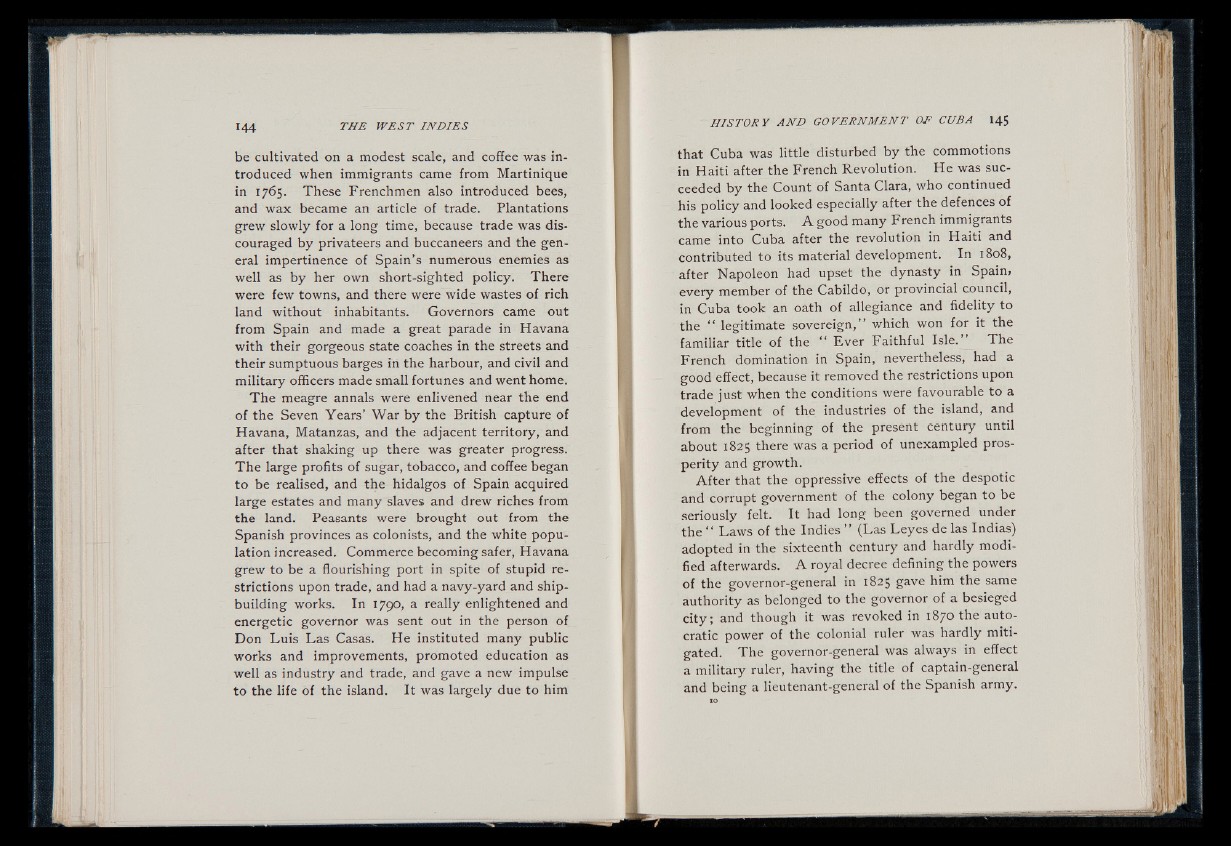
be cultivated on a modest scale, and coffee was introduced
when immigrants came from Martinique
in 1765. These Frenchmen also introduced bees,
and wax became an article of trade. Plantations
grew slowly for a long time, because trade was discouraged
by privateers and buccaneers and the general
impertinence of Spain’s numerous enemies as
well as by her own short-sighted policy. There
were few towns, and there were wide wastes of rich
land without inhabitants. Governors came out
from Spain and made a great parade in Havana
with their gorgeous state coaches in the streets and
their sumptuous barges in the harbour, and civil and
military officers made small fortunes and went home.
T h e meagre annals were enlivened near the end
of the Seven Y e a r s ’ War by the British capture of
Havana, Matanzas, and the adjacent territory, and
after that shaking up there was greater progress.
T h e large profits of sugar, tobacco, and coffee began
to be realised, and the hidalgos of Spain acquired
large estates and many slaves and drew riches from
the land. Peasants were brought out from the
Spanish provinces as colonists, and the white population
increased. Commerce becoming safer, Havana
grew to be a flourishing port in spite of stupid restrictions
upon trade, and had a navy-yard and shipbuilding
works. In 1790, a really enlightened and
energetic governor was sent out in the person of
Don Luis Las Casas. He instituted many public
works and improvements, promoted education as
well as industry and trade, and gave a new impulse
to the life of the island. It was largely due to him
that Cuba was little disturbed by the commotions
in Haiti after the French Revolution. He was succeeded
by the Count of Santa Clara, who continued
his policy and looked especially after the defences of
the various ports. A good many French immigrants
came into Cuba after the revolution in Haiti and
contributed to its material development. In 1808,
after Napoleon had upset the dynasty in Spain»
every member of the Cabildo, or provincial council,
in Cuba took an oath of allegiance and fidelity to
the “ legitimate sovereign,” which won for it the
familiar title of the “ Ever Faithful Is le .” The
French domination in Spain, nevertheless, had a
good effect, because it removed the restrictions upon
trade just when the conditions were favourable to a
development of the industries of the island, and
from the beginning of the present century until
about 1825 there was a period of unexampled prosperity
and growth.
A fte r that the oppressive effects of the despotic
and corrupt government of the colony began to be
seriously felt. It had long been governed under
the ‘ ‘ Laws of the Indies ” (Las L e y e s de las Indias)
adopted in the sixteenth century and hardly modified
afterwards. A royal decree defining the powers
of the governor-general in 1825 gave him the same
authority as belonged to the governor of a besieged
c ity ; and though it was revoked in 1870 the autocratic
power of the colonial ruler was hardly mitigated.
T he governor-general was always in effect
a military ruler, having the title of captain-general
and being a lieutenant-general of the Spanish army.
xo